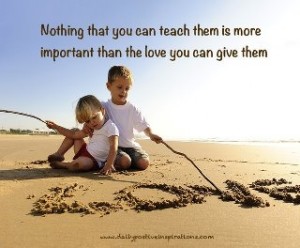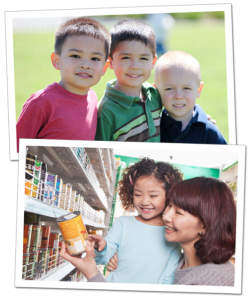From the Principal’s Desk:
Play in Preschool: Why it Matters
Play is the foundation for all learning for young children, and giving your child the
time and a few basic toys can provide him/ her with a variety of valuable learning
opportunities. “Play is how children begin to understand and process their
world,” says Angie Rupan, Program Coordinator for Child Development Center in
South San Francisco, CA and early childhood educator for over 20 years. “Children’s
play unlocks their creativity and imagination, and develops reading, thinking, and
problem solving skills as well as further develops motor skills. It provides the base
foundation for learning.”
Why is play so important and what do preschoolers learn when they play? Try a few
of these simple ideas with items you have around your house and learn about the educational benefits that each can provide for your child.
Inspirational Quotes for parents:

Volunteer Spotlight:

We want to thank Sarah Richter for putting together a wonderful Teacher Appreciation October Event. The teachers loved the doughnuts and pizza. YUMMY!!!!

We would also like to thank Erin Hoover and Elizabeth Byrnes for volunteering to help with pictures this fall. We could not have done it without you! Thank you again!!!
SAVE THE DATE:
We will be closed on Wednesday, November 11th for our Staff Professional Development Day. The staff will receive training on various topics, time to network and some team building.
We will also be closed on November 26th and 27th in observation of Thanksgiving.
Parent Reminders
-
Please be sure to wash your child’s hands upon entering the classroom.
-
If your child has received any new immunizations, please make sure we have an updated record in your child’s file.
-
All outside food must be store bought.
-
Inform the front office if your emergency contact information changes.
-
Please sign your child in and out each day.
-
Label all your child’s belongings.
-
Please put appropriate foot wear on your child for active play.
It is time for our FALL ANCILLARY PROGRAMS





Monday Morning: Daisy Dance is a ballet, tap and a creative movement dance program designed to teach children a life long love of movement and provide a foundation for all dance genres. Please click here for the registration form. You can add dance at the beginning of each month.
Tuesday Morning: Preschool Music Adventure is an original approach that successfully engages active preschoolers in musical activities, in order to enhance their overall development. We are very excited about this new music program. . We will do a mini holiday session in November and December
Wednesday Afternoon: T.O.T (Teams of Tomorrow) is an awesome training program that focuses on basketball handling and dribbling skills. The onsite classes are fun, educational and active. Please click here to access the registration form.
Thursday Morning: Soccer Shots is a popular non-competitive youth soccer program. This program teaches confidence, fun, character, teamwork, coordination and imagination. Our Next session will begin in March.
Friday Morning: King Tiger Tae Kwon Do is taught according to individual needs and levels of skills. Students begin to establish, and actually achieve, personal goals. Students learn that, by setting realistic goals and applying dedication and hard work, anything is possible. They develop confidence! The virtues of Respect, Concentration, Discipline, and Motivation are the characteristics of a truly confident individual. We will have a new session beginning Friday,Oct. 30th -Dec.18th. Registration forms are located at the front desk.
From the Education Department
4 Ways to Instill Thankfulness in Young Children
It’s never too early to teach your child about thankfulness. By learning concepts of generosity and compassion, children strengthen their connection to their community and become sensitive to the feelings of others.
The holiday season is quickly approaching, so now is a great time to reinforce the importance of thankfulness and giving back to those in need.
Below are age appropriate activities that we implement in the classroom, as well as activities for you and your child to do at home.
TODDLERS: Be a good role model
In the classroom: Our teachers introduce “please” and “thank you” to our toddlers by using sign language and verbal communication. Students practice good manners with their dolls, stuffed animals and each other.At home: Modeling positive behaviors is a great way to teach your child good manners. Say “please” before asking him to do something, and always follow with “thank you.”
Recommended reading: Little Critter® I Am Helping by Mercer Mayer
BEGINNERS: Share your gratitude out loud
In the classroom: Our teachers encourage our Beginner students to name a few of their favorite toys and games, and bring one in from home to share with friends. By sharing their belongings, children nurture connections with their classmates, and build necessary problem-solving skills.
At home: Talk with your child about the things in your life for which you are thankful, and ask him to name a few as well. Extend the discussion beyond physical possessions. For instance, if he is thankful for a favorite toy, say “Grandma bought you that toy, and we are thankful for her.”
Recommended reading: Spot Helps Out by Eric Hill
INTERMEDIATES: Show appreciation through actions
In the classroom: By age three, children begin to understand the concept of appreciation. They create birthday cards for their teachers, make art projects for friends, and write thank you cards for classroom visitors.
At home: Go shopping with your child, and buy a small token of appreciation for a friend or family member. Ask your child to draw a picture or write a thank you note to accompany the gift.
Recommended reading: Clifford’s Good Deeds by Norman Bridwell
PRE-K/PRE-K2: Give back to those in need
In the classroom: During the holidays, many of our schools host donation drives for organizations in need. Our older preschoolers discuss why they are participating, count the items donated, and sometimes have the opportunity to deliver the donations.
At home: Donate canned goods to a local food pantry, and allow your child to choose the food that he would like to donate. Explain to him that you are thankful to have good food to eat, and that you want to make sure that others have the same.
Recommended reading: The Giving Tree by Shel Silverstein
We provide many opportunities for our preschoolers to develop thankfulness and show gratitude towards others. By setting this positive foundation, your child will be more appreciative and generous as he enters elementary school and beyond.
– Lauren Starnes, PhD – Director of Early Childhood Education

November Newsletter
From the Principal’s Desk:
Play in Preschool: Why it Matters
Play is the foundation for all learning for young children, and giving your child the
time and a few basic toys can provide him/ her with a variety of valuable learning
opportunities. “Play is how children begin to understand and process their
world,” says Angie Rupan, Program Coordinator for Child Development Center in
South San Francisco, CA and early childhood educator for over 20 years. “Children’s
play unlocks their creativity and imagination, and develops reading, thinking, and
problem solving skills as well as further develops motor skills. It provides the base
foundation for learning.”
of these simple ideas with items you have around your house and learn about the educational benefits that each can provide for your child.
When playing with other children vocabulary and language skills are fostered. Your child will listen and learn the language he/she hears without even realizing. Children will learn to use language to communicate meaning as well as picking up new words and hearing the grammatical structure of the English language.Vehicles, animals,playing with cars, trucks and trains provides for many new vocabulary words as children learn the names of each, what they do, what they eat or where you can find them. Playing with a dollhouse or dolls allows your child to reenact what happens in everyday life, using the words and phrases he/she hears. You are likely to hear your own words come out their mouth as they recreate events that have happened, perhaps with an outcome more suited to thier liking!
In our fast paced and high tech society, children have fewer and fewer opportunities to use and develop their creativity. Children who are not given frequent opportunities to play may have a difficult time entertaining themselves as they simply do not know what to do without instruction. By providing opportunities for open ended play, your child will automatically get her creative juices flowing, and the possibilities are endless. For dramatic play provide a few props such as dishes and play food, empty food boxes and a cash register or stuffed animals and a doctor’s kit, and your child will be transported into a different place!
Gross motor skills involve the large muscles of the legs and arms while fine motor development is building the muscles of the hands that will be used for writing. Play can provide many opportunities to work on strengthening these muscles without your child even being aware of it! Kicking balls and walking on balance beams can help your child become more coordinated. Get outside and kick a ball around, create a goal area to make it a game. Anytime you see a narrow brick wall or wooden plank, give your child some assisted practice at balancing. Gather up the toys you have around the house and make it a point to provide ample time for play.
Inspirational Quotes for parents:
Volunteer Spotlight:
We want to thank Sarah Richter for putting together a wonderful Teacher Appreciation October Event. The teachers loved the doughnuts and pizza. YUMMY!!!!
We would also like to thank Erin Hoover and Elizabeth Byrnes for volunteering to help with pictures this fall. We could not have done it without you! Thank you again!!!
SAVE THE DATE:
We will be closed on Wednesday, November 11th for our Staff Professional Development Day. The staff will receive training on various topics, time to network and some team building.
We will also be closed on November 26th and 27th in observation of Thanksgiving.
Parent Reminders
It is time for our FALL ANCILLARY PROGRAMS
Monday Morning: Daisy Dance is a ballet, tap and a creative movement dance program designed to teach children a life long love of movement and provide a foundation for all dance genres. Please click here for the registration form. You can add dance at the beginning of each month.
Tuesday Morning: Preschool Music Adventure is an original approach that successfully engages active preschoolers in musical activities, in order to enhance their overall development. We are very excited about this new music program. . We will do a mini holiday session in November and December
Wednesday Afternoon: T.O.T (Teams of Tomorrow) is an awesome training program that focuses on basketball handling and dribbling skills. The onsite classes are fun, educational and active. Please click here to access the registration form.
Thursday Morning: Soccer Shots is a popular non-competitive youth soccer program. This program teaches confidence, fun, character, teamwork, coordination and imagination. Our Next session will begin in March.
Friday Morning: King Tiger Tae Kwon Do is taught according to individual needs and levels of skills. Students begin to establish, and actually achieve, personal goals. Students learn that, by setting realistic goals and applying dedication and hard work, anything is possible. They develop confidence! The virtues of Respect, Concentration, Discipline, and Motivation are the characteristics of a truly confident individual. We will have a new session beginning Friday,Oct. 30th -Dec.18th. Registration forms are located at the front desk.
From the Education Department
4 Ways to Instill Thankfulness in Young Children
It’s never too early to teach your child about thankfulness. By learning concepts of generosity and compassion, children strengthen their connection to their community and become sensitive to the feelings of others.
The holiday season is quickly approaching, so now is a great time to reinforce the importance of thankfulness and giving back to those in need.
Below are age appropriate activities that we implement in the classroom, as well as activities for you and your child to do at home.
TODDLERS: Be a good role model
In the classroom: Our teachers introduce “please” and “thank you” to our toddlers by using sign language and verbal communication. Students practice good manners with their dolls, stuffed animals and each other.At home: Modeling positive behaviors is a great way to teach your child good manners. Say “please” before asking him to do something, and always follow with “thank you.”
Recommended reading: Little Critter® I Am Helping by Mercer Mayer
BEGINNERS: Share your gratitude out loud
In the classroom: Our teachers encourage our Beginner students to name a few of their favorite toys and games, and bring one in from home to share with friends. By sharing their belongings, children nurture connections with their classmates, and build necessary problem-solving skills.
At home: Talk with your child about the things in your life for which you are thankful, and ask him to name a few as well. Extend the discussion beyond physical possessions. For instance, if he is thankful for a favorite toy, say “Grandma bought you that toy, and we are thankful for her.”
Recommended reading: Spot Helps Out by Eric Hill
INTERMEDIATES: Show appreciation through actions
In the classroom: By age three, children begin to understand the concept of appreciation. They create birthday cards for their teachers, make art projects for friends, and write thank you cards for classroom visitors.
At home: Go shopping with your child, and buy a small token of appreciation for a friend or family member. Ask your child to draw a picture or write a thank you note to accompany the gift.
Recommended reading: Clifford’s Good Deeds by Norman Bridwell
PRE-K/PRE-K2: Give back to those in need
In the classroom: During the holidays, many of our schools host donation drives for organizations in need. Our older preschoolers discuss why they are participating, count the items donated, and sometimes have the opportunity to deliver the donations.
At home: Donate canned goods to a local food pantry, and allow your child to choose the food that he would like to donate. Explain to him that you are thankful to have good food to eat, and that you want to make sure that others have the same.
Recommended reading: The Giving Tree by Shel Silverstein
We provide many opportunities for our preschoolers to develop thankfulness and show gratitude towards others. By setting this positive foundation, your child will be more appreciative and generous as he enters elementary school and beyond.
– Lauren Starnes, PhD – Director of Early Childhood Education